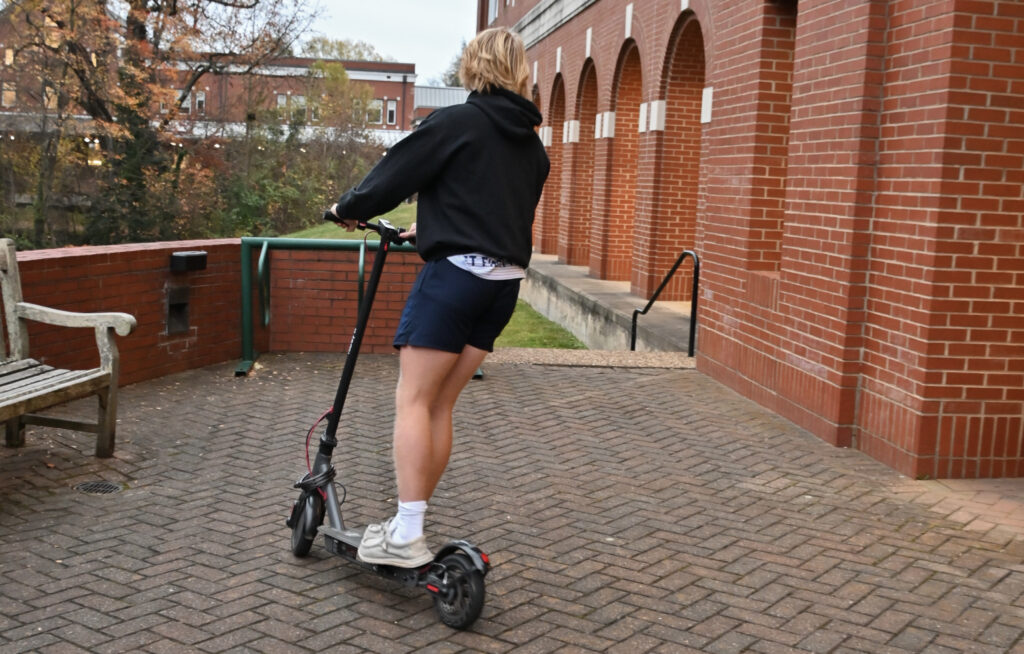UMW releases electric scooter usage guidelines
4 min read
Scooter riders are advised to yield to pedestrians and dismount while in high traffic areas on campus due to limited space and higher risk of collision. | Abbey Magnet, The Weekly Ringer
by ALEXA DELACONCEPCIO
Staff Writer
This semester, the campus community has observed an uptick in students’ usage of electric scooters to travel to and from classes, leading to complaints from students and faculty about unsafe use and the potential dangers they impose.
On Nov. 11, an email in accordance with the UMW Broadcast Email Policy was sent out to students and faculty from the Office of Emergency Management and Safety, addressing the safety concerns associated with the increased usage.
“While we recognize the convenience of scooters as a mode of transportation, their use must follow Virginia law, local ordinances, and general use guidelines,” the email read.
Vice President for Student Affairs Juliette Landphair said the number of people using electric scooters on campus has risen markedly this semester. With this, the number of grievances regarding these vehicles rose as well.
“We have received complaints from students about the scooter use in buildings and input from staff members about damage to floors and also occasionally blocking doors/egress,” she said.
The campus-wide email continued to state the prohibition of scooter use and storage indoors. This policy is an extension of existing guidelines that prohibit scooters from entering residence halls.
“It will help keep the residence halls cleaner because there have been a lot of tire marks and chips in the floor from the scooters,” said Celine Jenkins, a junior accounting major and scooter owner.
In addition to the guidance on indoor safety, UMW also addressed traffic and safety issues regarding both scooters and bicycles on campus, specifically around high-traffic areas such as the covered walkway at Woodard Hall and Simpson Library.
“Several students have shared with me their concerns about people riding electric scooters and electric bikes quickly past them on campus, especially down by Woodard Hall and the Simpson Library,” Landphair said.
Sophomore conservation biology major Lana Carter said she has had previous issues with the scooters around campus.
”One of my personal experiences was a time where I was walking past the Simpson Library on my way to class and two scooters came speeding past and almost hit me,” she said. “After this incident happened, I felt very frustrated that they have no awareness about their surroundings.”
Carter explained that in her experience, bicyclists are often more courteous than scooter users because they appear to have more control and awareness when riding.
“I think in comparison to the scooters, the cyclists have much more control over their actions while operating an object that can potentially cause injury to themselves and others,” she said. “I will admit that if you have no other way of transportation around campus, a non-electric option would make the students that are walking feel safer.”
A similar concern in regard to campus safety is the fire hazard that electric vehicles pose.
“For years we have had a prohibition on electric vehicles in residence halls,” Landphair said. “We decided to expand that to all UMW buildings given the fire hazard that electric scooters impose.”
According to the email, “lithium-ion batteries used in electric scooters and other devices may pose a safety risk. They do not go through UL testing to ensure safety and performance standards. If the batteries are not used as directed or are defective, they can overheat, catch fire, or explode.”
The email further emphasized the importance of vehicle safety and considering the limitations while riding. Riders are advised to obey traffic laws, yield to pedestrians and dismount the vehicle in high-traffic areas on campus where space may be limited.
Riders must also do so in accordance with the Fredericksburg code pertaining to downtown streets, which prohibits the use of such vehicles on the streets, sidewalks and parking lots of Downtown Fredericksburg, and Virginia law for electric personal assistive mobility devices, electrically-powered toy vehicles, electric power-assisted bicycles and motorized skateboards or scooters, which regulates the maximum speed at which these vehicles may operate, as well as where they are permitted to be ridden.
Landphair and the Office of Emergency Management and Safety recommend that all scooter-riding students lock their scooters on outside bike racks or other appropriate structures so long as they do not impede, ingress or egress to campus buildings.
According to Landphair and the email, the Office of Student Affairs is working with the Student Government Association to further develop these policies. The policies will also be developed based on feedback received throughout the semester.
“We will review policy related to these devices this fall and work with the Student Government Association on further delineating appropriate scooter use on campus with pedestrian safety in mind,” the email read.


